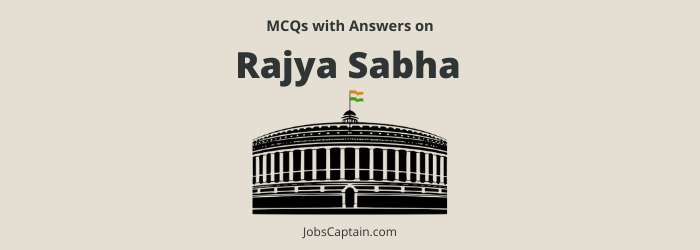
Rajya Sabha is the upper house of the Indian Parliament. This blog post contains 20 MCQ questions on Rajya Sabha based on the latest pattern of the UPSC Prelims Exam.
| Quiz Set | 1 | 2 | MCQ on Indian Polity and Governance |
Question 1: The Representation of States in Council of States is based on _________.
(A) Equal for all States
(B) Ratio of their Population
(C) Ratio of their Area
(D) Ratio of their Revenue
Question 2: How is Rajya Sabha dissolved?
(A) At the end of Chairman’s tenure
(B) President dissolves after 5 years
(C) Dissolves with Lok Sabha automatically
(D) None of the above
Question 3: The members of Council of States are elected by ___________.
(A) Members of Legislative Assembly of States
(B) Members of Legislative Council of States
(C) Members of both Legislative Assembly and Council
(D) Members of Municipalities and Gram Panchayat
Question 4: The number of members nominated by the President in Rajya Sabha is _________.
(A) 10
(B) 15
(C) 12
(D) 20
Question 5: In which year was Rajya Sabha Constituted for the first time?
(A) 1950
(B) 1951
(C) 1952
(D) 1953
Question 6: The first actress to be nominated to Rajya Sabha _________.
(A) Jayalalitha
(B) Nargis Dutt
(C) Vaijayanthimala
(D) Devika Rani
Question 7: The Rajya Sabha consists of __________.
(A) 280 members of which 20 members are nominated by the President of India
(B) 275 members of which 18 members are nominated by the President of India
(C) 250 members of which 12 members are nominated by the President of India
(D) 252 members of which 12 members are nominated by the President of India
Question 8: Which of the following statements is correct regarding the Rajya Sabha?
(A) One-third of its members retire every two years
(B) One-half of its members retire every two years
(C) One-half of its members retire every three years
(D) One-third of its members retire every three years
Question 9: What is the tenure of a member of Council of State?
(A) 3 years
(B) 5 years
(C) 6 years
(D) 2 years
Question 10: Which one of the following comes under the exclusive power of the Council of States?
(A) Creation of new All India Services
(B) Election of Vice-President of India during casual vacancy
(C) Abolition of Legislative Council of any State
(D) Removal of its chairman
Question 11: Member of Rajya Sabha is elected __________.
(A) For four years
(B) For five years
(C) For six years
(D) For life long
Question 12: Which one of the following statements is not correct regarding the power of the Parliament to legislate on a matter in the State List?
(A) The Rajya Sabha has to declare that it would be necessary in the national interest
(B) A resolution has been passed by Rajya Sabha by not less than two-third of the members present and voting
(C) The legislation could be for the whole or any part of the Country
(D) Only the Rajya Sabha can make laws with respect to a matter in the State list in the national interest
Question 13: Rajya Sabha is called Permanent House because __________.
(A) All members are lifelong
(B) It cannot be dissolved
(C) Some members retire after every two years
(D) Both (B) and (C) are true
Question 14: The Parliament of India acquires the power to legislate on any item in the State List in the national interest if a resolution to that effect is passed by the _________.
(A) Lok Sabha by a simple majority of its total membership
(B) Lok Sabha by a majority of not less than two-third of its total membership
(C) Rajya Sabha by a simple majority of its total membership
(D) Rajya Sabha by a majority of not less than two-third of its members present and voting
Question 15: According to our Constitution, the Rajya Sabha __________.
(A) is dissolved once in two years
(B) is dissolved every five years
(C) is dissolved every six years
(D) is not subject of dissolution
Question 16: Which of the following special powers has been conferred on the Rajya Sabha by the Constitution of India?
(A) To change the existing territory of a State and to change the name of a State
(B) To pass a resolution empowering the Parliament to make laws in the State List and to create one or more All India Services
(C) To amend the election procedure of the President and to determine the pension of the President after his/her retirement
(D) To determine the functions of the Election Commission and to determine the number of Election Commissioners
Question 17: Right to dissolve the Rajya Sabha is vested in ___________.
(A) President
(B) Vice-President
(C) Supreme Court
(D) None of the above
Question 18: Which of the following Articles of the Indian Constitution empowers the Parliament to legislate on any matter in the State List?
(A) Article 115
(B) Article 116
(C) Article 226
(D) Article 249
Question 19: Which one of the following statements about Rajya Sabha is correct?
(A) It is not subject to dissolution
(B) Its members are chosen by direct election from territorial constituencies in the States
(C) It is required to choose, as soon as may be a member of the Rajya Sabha to be the Chairman thereof
(D) The Attorney General of India does not have the right to speak in Rajya Sabha
Question 20: A resolution passed by the Rajya Sabha under Article 249 of the constitution empowering Parliament to legislate on a state subject in national interest remains in force for a period.
(A) Not exceeding six months
(B) Not exceeding two years
(C) Not exceeding one year
(D) Of unlimited time
| Quiz Set | 1 | 2 | Indian Polity and Governance Quiz |
